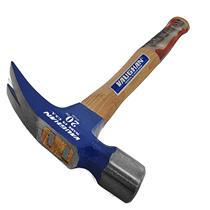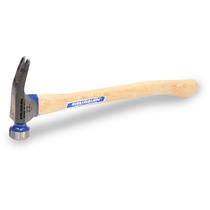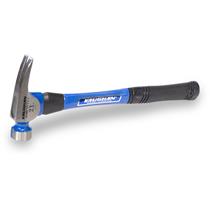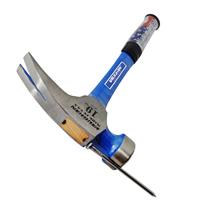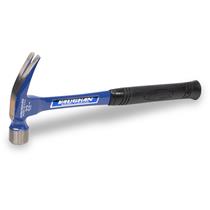Have you ever spent hours perfecting a project, only to damage the baseboards or door trim at the last moment? You may have always blamed yourself, but the truth is you may have been using the wrong kind of hammer. Different hammers are used for different jobs, and it’s crucial to know when to use each. Hammers vary in weight, length, style, and what tasks they are useful for. Let’s breakdown the key factors: handle, head style, and weight, so you can choose the perfect hammer for the job.
1. Handle Specifications
Material
When choosing a handle, think about which will be the most comfortable and reliable. Generally, there are three main types: wood, fiberglass, and steel.
- Wood (American hickory): known for reducing vibration and providing optimal balance
- Fiberglass: can withstand harsh weather conditions and is highly shock-absorbent
- Steel: offers the most durability and has a hickory plug for better shock absorption

Size and Style
Another consideration is handle length and style.
- Length: short handles gives more accurate strikes, while a long handle provides more force
- Style: choose curved or straight; notably, there is no actual difference - it's solely based on personal perference.

2. Head Style
Claw Types
The claw type on a hammer matters. There are two main types of claw- rip and nail- and each serves a different purpose.

- Rip Hammers: bear a straight claw, designed perfectly for framing tasks and demolition; the VAUGHAN California Framer® rip claw hammer has a magnetic nail starter, allowing you to start a nail in hard-to-reach places more easily.
- Nail Hammers: bear a curved claw, designed for pulling nails more easily and efficiently


Hammer Face
- Milled Face: typically found on rip hammers; milled face grants more contact to drive nails that aren't perfectly hit
- Smooth Face: typically found on nail hammers; smooth face prevents marring on finish work, perfect for jobs where appearance matters, like trim and baseboards


3. Weight
VAUGHAN hammers vary in weight from 10 oz to 32 oz. The weight of your hammer can make a significant difference in your work.
- Lighter Hammers: ideal for finish work and general-purpose tasks where accuracy is important
- Heavier Hammers: best for driving heavier nails, demolition, and tasks requiring more power

So, next time you’re working on a home project—whether you are installing trim, baseboards, or framing—your VAUGHAN hammer, paired with your new knowledge and confidence, will help you get the job done right.
